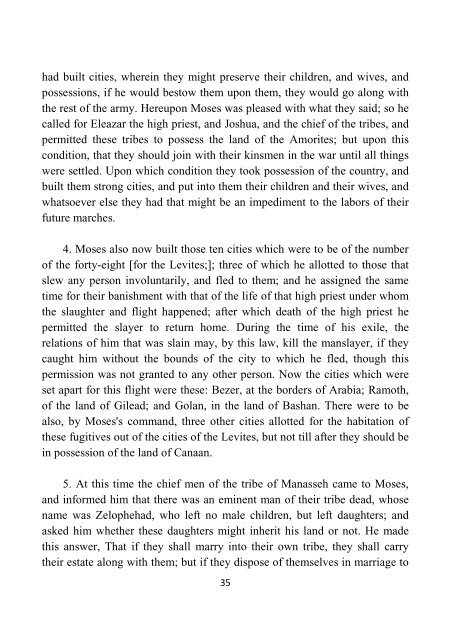From the Rejection of That Generation to the Death of Moses - Flavius Josephus
You also want an ePaper? Increase the reach of your titles
YUMPU automatically turns print PDFs into web optimized ePapers that Google loves.
had built cities, wherein <strong>the</strong>y might preserve <strong>the</strong>ir children, and wives, and<br />
possessions, if he would bes<strong>to</strong>w <strong>the</strong>m upon <strong>the</strong>m, <strong>the</strong>y would go along with<br />
<strong>the</strong> rest <strong>of</strong> <strong>the</strong> army. Hereupon <strong>Moses</strong> was pleased with what <strong>the</strong>y said; so he<br />
called for Eleazar <strong>the</strong> high priest, and Joshua, and <strong>the</strong> chief <strong>of</strong> <strong>the</strong> tribes, and<br />
permitted <strong>the</strong>se tribes <strong>to</strong> possess <strong>the</strong> land <strong>of</strong> <strong>the</strong> Amorites; but upon this<br />
condition, that <strong>the</strong>y should join with <strong>the</strong>ir kinsmen in <strong>the</strong> war until all things<br />
were settled. Upon which condition <strong>the</strong>y <strong>to</strong>ok possession <strong>of</strong> <strong>the</strong> country, and<br />
built <strong>the</strong>m strong cities, and put in<strong>to</strong> <strong>the</strong>m <strong>the</strong>ir children and <strong>the</strong>ir wives, and<br />
whatsoever else <strong>the</strong>y had that might be an impediment <strong>to</strong> <strong>the</strong> labors <strong>of</strong> <strong>the</strong>ir<br />
future marches.<br />
4. <strong>Moses</strong> also now built those ten cities which were <strong>to</strong> be <strong>of</strong> <strong>the</strong> number<br />
<strong>of</strong> <strong>the</strong> forty-eight [for <strong>the</strong> Levites;]; three <strong>of</strong> which he allotted <strong>to</strong> those that<br />
slew any person involuntarily, and fled <strong>to</strong> <strong>the</strong>m; and he assigned <strong>the</strong> same<br />
time for <strong>the</strong>ir banishment with that <strong>of</strong> <strong>the</strong> life <strong>of</strong> that high priest under whom<br />
<strong>the</strong> slaughter and flight happened; after which death <strong>of</strong> <strong>the</strong> high priest he<br />
permitted <strong>the</strong> slayer <strong>to</strong> return home. During <strong>the</strong> time <strong>of</strong> his exile, <strong>the</strong><br />
relations <strong>of</strong> him that was slain may, by this law, kill <strong>the</strong> manslayer, if <strong>the</strong>y<br />
caught him without <strong>the</strong> bounds <strong>of</strong> <strong>the</strong> city <strong>to</strong> which he fled, though this<br />
permission was not granted <strong>to</strong> any o<strong>the</strong>r person. Now <strong>the</strong> cities which were<br />
set apart for this flight were <strong>the</strong>se: Bezer, at <strong>the</strong> borders <strong>of</strong> Arabia; Ramoth,<br />
<strong>of</strong> <strong>the</strong> land <strong>of</strong> Gilead; and Golan, in <strong>the</strong> land <strong>of</strong> Bashan. There were <strong>to</strong> be<br />
also, by <strong>Moses</strong>'s command, three o<strong>the</strong>r cities allotted for <strong>the</strong> habitation <strong>of</strong><br />
<strong>the</strong>se fugitives out <strong>of</strong> <strong>the</strong> cities <strong>of</strong> <strong>the</strong> Levites, but not till after <strong>the</strong>y should be<br />
in possession <strong>of</strong> <strong>the</strong> land <strong>of</strong> Canaan.<br />
5. At this time <strong>the</strong> chief men <strong>of</strong> <strong>the</strong> tribe <strong>of</strong> Manasseh came <strong>to</strong> <strong>Moses</strong>,<br />
and informed him that <strong>the</strong>re was an eminent man <strong>of</strong> <strong>the</strong>ir tribe dead, whose<br />
name was Zelophehad, who left no male children, but left daughters; and<br />
asked him whe<strong>the</strong>r <strong>the</strong>se daughters might inherit his land or not. He made<br />
this answer, <strong>That</strong> if <strong>the</strong>y shall marry in<strong>to</strong> <strong>the</strong>ir own tribe, <strong>the</strong>y shall carry<br />
<strong>the</strong>ir estate along with <strong>the</strong>m; but if <strong>the</strong>y dispose <strong>of</strong> <strong>the</strong>mselves in marriage <strong>to</strong><br />
35

















